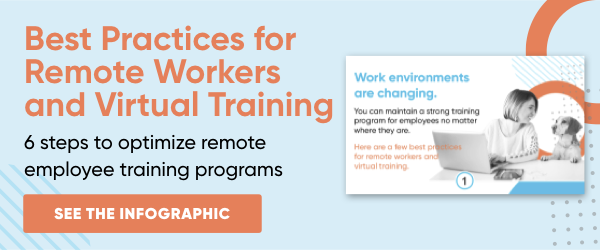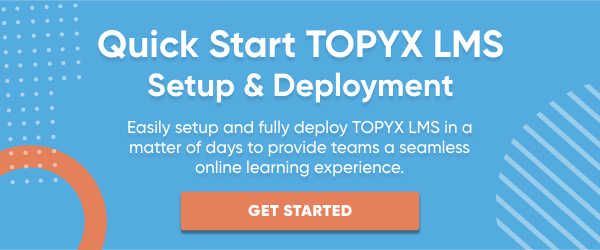Manufacturers value training and development. In fact, the manufacturing sector spent more on training per learner ($1,217) than any other industry in 2017.¹
While the manufacturing industry can use a variety of tools to deliver that training, including eLearning platforms, in-person classes, and blended learning tools, a learning management system (LMS) is often the best option for distributing and tracking training. By using an LMS, manufacturers gain access to a wide variety of tools, including learning paths to personalize training by role, mobile learning, and reports.
Related Reading: Want to Increase Manufacturing Productivity? Start Your Manufacturing Training Program Like This
Because of the solid business benefits LMS systems offer, manufacturers should invest a portion of their training funds into learning management system software.

3 Reasons Manufacturing Companies
Should Invest in an LMS
Manufacturing companies that invest in an LMS see a range of benefits, from lower costs to increases in revenue and employee retention. Here are three statistics that illustrate the value an LMS brings to manufacturing businesses.
1. eLearning contributed to Toyota raising $249.9 billion in revenue
LMS systems can increase business income for manufacturers by providing staff with eLearning. For example, Toyota Motor Corporation, which consists of over 340,000 employees working in 51 manufacturing branches in 28 countries, had raised $249.9 billion by 2017. This was due in part to the implementation of eLearning.
“Toyota Motor Europe has been using eLearning to train over 18,000 motor technicians and engineers since 2005. The company upgraded to the latest version of its LMS in 2013 to provide continuous training without having to be re-certified,” stated Belitsoft Software Development Company. “(The) Toyota learning program includes 150 classes for its certified technical staff, as well as training courses for non-technical employees working for distributors in Europe and Asia.”²
eLearning systems are ideal platforms for creating, distributing, and tracking online learning. The most effective business LMS systems for the manufacturing industry are equipped with tools that facilitate content creation and content management and give learners constant access to training, which can increase revenue over time.
Related Reading: How to Find an Effective LMS for the Manufacturing Industry
2. Every dollar manufacturers invest in safety programs provides a payback of $4 to $6 in reduced costs
Millions of nonfatal injuries and illnesses are reported in U.S. workplaces each year.³ This can have a major impact on a manufacturing company’s financial health. Manufacturing employee injuries are unavoidable, but safety programs can help protect an organization’s workers as well as its bottom line.
“Manufacturers see workplace safety as an important business tool. Rather than simply a cost of doing business, safety programs reduce costs and contribute to the bottom line,” stated the Manufacturing Institute.4
Each dollar manufacturers invest in safety programs provides a payback of $4 to $6 in reduced costs, per the Safety Management Group.5 A contributor noted that comprehensive safety and health programs also increase staff productivity, competitiveness, morale, and company profits.
Related Reading: How an LMS Can Promote Safety and Productivity as Your Manufacturing Employees Return to Work
Manufacturing companies can use LMS systems in tandem with safety management software to make improvements. An LMS can be used to educate workers on safety best practices, compliance requirements, and the most effective ways to incorporate them into specific manufacturing environments. Safety management software can then track, manage, and report on safety incidents before and after training is implemented. Using both tools together to implement training and track changes in safety events gives manufacturing companies a clear understanding of the impact training is having on safety incidents.
3. New manufacturing employees stick with a job for 4.6 years
According to Training Industry, new manufacturing hires stay in their initial job roles for about 5 years.6 This is impressive, considering 71 percent of recent college grads stick with their first job for a year or less.7 Still, there is a shortage of skilled manufacturing workers, especially in roles that require more experience. That’s why training has to be a continuous process in the manufacturing sector.
Training and development via LMS eLearning can help manufacturing employees move up the career path without leaving their company. This reduces the turnover burden on manufacturing companies while increasing an employee’s professional value. Organizations can promote retention by creating learning paths that increase skills and an in-house career trajectory that ensures workers are promoted and retained.
Related Reading: Can an LMS Help Manufacturing Employees Gain Critical Skills?
Additional Business Benefits of LMS Systems for Manufacturers
LMS systems help manufacturers increase revenue, reduce costs related to safety, and promote employee retention via continuous learning. They also help companies close the manufacturing skills gap, reduce customer questions, increase visibility of metrics, and lower the cost of manufacturer training.
Start Offering Your Employees Mobile Learning Within Days
Companies that want to begin offering mobile learning or improve the mobile learning program they already have will benefit from TOPYX LMS. Launch TOPYX and deliver mobile learning to your workforce in a matter of days with our Quick Start Program.
References:
1. Training Magazine. 2017 training industry report. https://trainingmag.com/trgmag-article/2017-training-industry-report/.
2. Belitsoft Software Development Company. Top successful companies using corporate eLearning. https://belitsoft.com/blog/successful-companies-using-elearning.
3. eLeap Software. Observation checklists support manufacturing safety. https://www.eleapsoftware.com/observational-checklist-support-manufacturing-safety/.
4. Manufacturing Institute. Rate of occupational injuries in manufacturing. http://www.themanufacturinginstitute.org/Research/Facts-About-Manufacturing/Workforce-and-Compensation/Occupational-Injuries/Occupational-Injuries.aspx.
5. Safety Management Group. Safety’s impact on the bottom line. https://safetymanagementgroup.com/safetys-impact-on-the-bottom-line-3/.
6. eLearning Industry. eLearning in the manufacturing industry: learning the ropes. https://elearningindustry.com/elearning-in-the-manufacturing-industry-today-learning-ropes.
7. Express Employment Professionals. New survey: recent college grads leave first jobs quickly. https://www.expresspros.com/Newsroom/America-Employed/New-Survey-Results--Recent-Grads-Leave-First-Jobs-Quickly.aspx.








